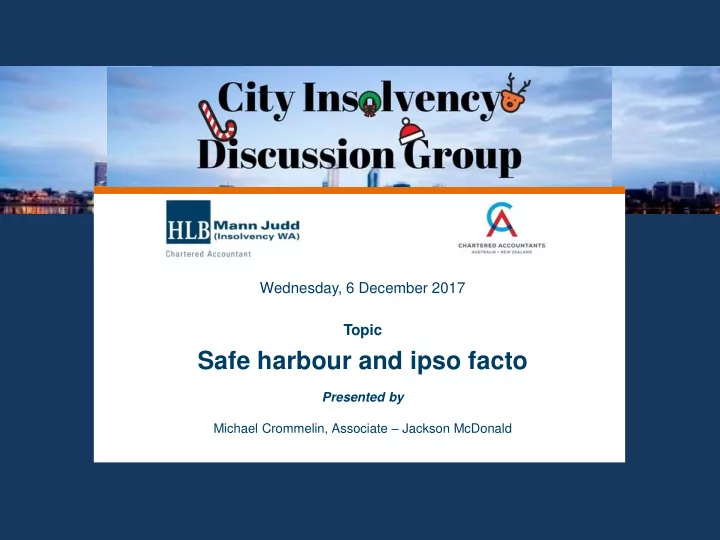

City Insolvency Discussion Group Wednesday, 6 December 2017 Topic Safe harbour and ipso facto Presented by Michael Crommelin, Associate – Jackson McDonald
Safe harbour for insolvent trading and ipso facto clauses Michael Crommelin Associate, Jackson McDonald
Calls for reform “[Australia’s] current insolvent trading laws • put too much focus on stigmatising and penalising failure…” Two main culprits: • Operation of ipso facto clauses Lack of safe harbour for directors
Ipso facto clauses An ipso facto clause gives a party a right to • terminate or modify a contract upon the occurrence of a specified event “ Insolvency Event ” examples: • Company becomes insolvent Liquidator, receiver, • administrator, manager or controller is appointed Reorganisation or moratorium is • proposed etc. Application for winding up is • made • Company can’t pay debts as and when due
New law The new law introduces a stay on the operation • of ipso facto clauses in certain circumstances • Three categories: Compromise or arrangement (s 415D) Managing controller (s 434J) Administration (s 451E)
Period of the stay A stay will begin when the insolvency • event is set in motion and will end when the insolvency event wraps up • Counterparties retain the right to terminate for non-payment or non- performance Points to note •
Court orders, Ministerial declarations, Regulations The Court may extend or lift a stay, if “ satisfied that this • is appropriate in the interests of justice ” • The Court may order that one or more rights are enforceable only with the leave of the Court and in accordance with certain terms • The Minister may limit the stay’s application by declaration • The Regulations can be used to broaden the suite of reasons for which a right cannot be enforced A stay will not apply to a right that an administrator, • liquidator, managing controller or person overseeing a compromise or arrangement consents to in writing
Things to consider Lack of retrospective application will • “effectively create two classes of contracts… [which] will create a competitive imbalance in the economy…” Counterparties will opt to vary or amend contracts , rather than enter into new ones, to retain the benefit of pre-amendment ipso facto clauses
Things to consider Effect on precedents • • Volume of restructuring and turnaround work • Pricing and availability of credit Carve outs •
Things to consider • More companies opting to enter VA – s 451E(2)(c) Importance of identifying early warning signs of • insolvency
Safe harbour for directors The new law also provides a safe harbour for • directors who trade while insolvent, so long as certain conditions are met To enjoy the safe harbour, a director must have • developed a course of action that is reasonably likely to lead to a better outcome for the company, and they must incur the debt in connection with that course of action
Objective test The safe harbour will exist from the moment • the course of action is implemented, until the moment it ceases or is no longer “ reasonably likely to lead to a better outcome ”, or until the company is placed into administration
Evidentiary requirements • Directors must ensure employee entitlements are being paid and taxation reporting obligations met Directors must lead evidence to support safe harbour • • Directors cannot rely on company books if certain reporting obligations are not met A party alleging unreasonableness • against a director must lead evidence to that effect
Things to consider Appropriately qualified entity not defined • in the legislation Court may refuse safe • harbour if it deems entity not appropriately qualified
Things to consider Does not cover all debts • • Will directors be emboldened by the safe harbour? • What about creditors who deal with companies while they are enjoying safe harbour? Continuous disclosure rules •
Questions? Disclaimer: this presentation is for general information purposes and cannot be relied upon as legal advice
2017 CIDG TOPICS July Practical considerations and extracting value from the sale of a professional services practice – preservation of goodwill February Tom Meagher – Murfett Legal Can a creditor prove for a statute barred debt? Ray Christensen – Zilkens Lawyers August PPSA Updates March Matthew Noonan-Crowe – Valenti Lawyers Pre-insolvency advisors and illegal phoenix activity Murray Thornhill – HHG Legal Group September Technical and practical implications of the Insolvency Law April Reform Act Liquor Control Act 1988 (WA) – an overview and relevant Kellie Link – Norton Rose Fullbright considerations for insolvency practitioners Joanne Matich & Alexandra Matich, Joanne Matich + Associates October Trading and sale considerations for hospitality businesses May Murray Brown – GMO Corporate Trustee Update David John – Herbert Smith Freehills November Channel 10 Case June Dan Butler & Tegan Healey – Lavan Insolvency Hot Topics Hector West, Eleanor Taylor, Helene Chryssidis - Dentons December Safe harbour and ipso facto Michael Crommelin – Jackson McDonald
City Insolvency Discussion Group We wish you all a safe and happy Christmas. See you all in 2018! PD hours will be out this week.
Recommend
More recommend